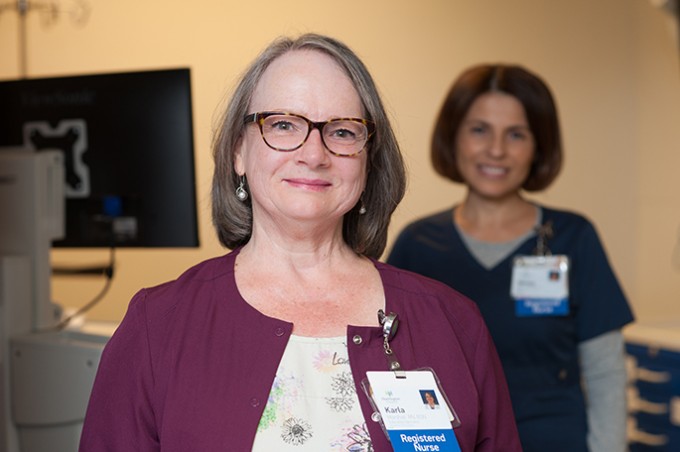My Specialty
Same Day Surgery, Karla Marshall, Huntington Hospital
Bridging the gap between ambulatory and extended stay surgical care

Karla Marshall, RN
Same Day Surgery Staff Nurse
Huntington Hospital, Pasadena
Please share the story of your nursing career.
My healthcare career began in June 1980, as a nurse’s aide on a neurosurgical thoracic unit. At the same time, I pursued my nursing education. Upon graduation, I worked in the cath lab for 22 years and neonatal for three years. In addition, I served as a nurse educator, conducting new grad training and new employee orientation. Although I enjoyed helping new nurses, I missed working directly with patients, so I began my current position in same day surgery.
What attracted you to same day surgery?
Since cath lab patients went to same day surgery on a regular basis, I already knew quite a few of the same day surgery staff and had grown to respect them and the unit. Also, I felt my prior nursing experience would help me be effective in this environment. Working directly with patients and seeing them through the entire surgical process, from intake to post-op and discharge, is extremely rewarding.
What happens in your same day surgery center?
We admit patients undergoing a variety of surgical procedures, which may include joint replacements, vascular surgeries, open heart surgeries, cholecystectomies, gastric bypass, bronchoscopies and many more. It is important to understand that we are not an ambulatory surgical center. We offer coordinated pre- and post-operative care for both same day and extended stay procedures.
As is common practice today, many patients are sent home on the same day they have their surgical procedures. These same procedures used to require multiple days of inpatient recovery. However, patients who have more complex operations may need to stay in the hospital until they have recovered enough to be discharged.
Our patient population’s ages range from 1-month-olds to centenarians. Our hospital contracts with Shriners Hospitals for Children, which allows us to help serve pediatric patients, many of whom are from outside the United States, for congenital medical issues such as cleft lip or palate and orthopedic interventions for scoliosis or osteogenesis imperfecta. We admit these children through our pre-op testing area, where they meet with an anesthesiologist and a nurse for preparation and education. After their surgery, they transfer to the pediatricunit for further care.












